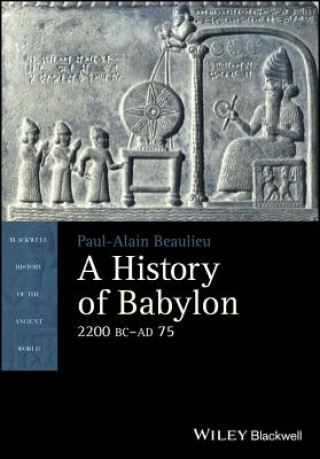
Kód: 04956358
History of Babylon, 2200 BC - AD 75
Autor Paul-Alain Beaulieu
The aim of this project is to write a narrative history of Babylon from the time of its First Dynasty (1880-1595) until the last centuries of the city's existence during the Hellenistic and Parthian periods (ca. 331-75 AD). During ... celý popis
- Jazyk:
 Angličtina
Angličtina - Väzba: Pevná
- Počet strán: 312
Nakladateľ: John Wiley and Sons Ltd, 2018
- Viac informácií o knihe

Mohlo by sa vám tiež páčiť
-

History of Babylon
67.46 € -

Babylonian World
73.70 € -

Rites of Conquest
29.75 € -

David Busch's Nikon Z50 Guide to Digital Photography
38.80 € -

Starman Tarot Kit
37.40 € -

God's Great Big Love
16.28 € -

Delaware Indians
61.23 € -

Seven Great Monarchies of the Ancient Eastern World, Vol 4. (of 7)
27.14 € -

Imaginative World of C.S. Lewis
102.46 € -

Seven Great Monarchies Of The Ancient Eastern World, Vol 2. (of 7)
77.82 € -

Seven Great Monarchies Of The Ancient Eastern World, Vol 5. (of 7)
65.15 € -

Heinses Stellung zur bildenden Kunst und ihrer Ästhetik
27.74 € -

Heilung Gibt Es Immer!
20.50 € -10 % -

Camino de ningún final
15.17 €
Darčekový poukaz: Radosť zaručená
- Darujte poukaz v ľubovoľnej hodnote, a my sa postaráme o zvyšok.
- Poukaz sa vzťahuje na všetky produkty v našej ponuke.
- Elektronický poukaz si vytlačíte z e-mailu a môžete ho ihneď darovať.
- Platnosť poukazu je 12 mesiacov od dátumu vystavenia.
Viac informácií o knihe History of Babylon, 2200 BC - AD 75
Nákupom získate 385 bodov
 Anotácia knihy
Anotácia knihy
The aim of this project is to write a narrative history of Babylon from the time of its First Dynasty (1880-1595) until the last centuries of the city's existence during the Hellenistic and Parthian periods (ca. 331-75 AD). During most of its history, Babylon was the capital of a kingdom that corresponded roughly to the southern and central parts of Iraq, an area commonly designated as 'Babylonia', although this term did not come into widespread use until Babylon had lost its independence and become a province of the Persian and Seleucid empires. At other times Babylon's rule extended well beyond Babylonia, for instance during the second half of the 6th century, when the city was the capital of a vast empire stretching from the Persian Gulf to Cilicia and from Jerusalem to the confines of Armenia. During the second millennium Babylon had received, synthesized and transformed the heritage of the old civilization of Sumer and Akkad to become the main expression of Mesopotamian civilization. Babylon even wielded decisive cultural influence over Assyria, although the latter was often more powerful politically and militarily. Babylonian became the international language of culture and diplomacy during the Late Bronze, and in almost every capital of the Near East including Egypt an elite of scribes copied and studies classics of Babylonian literature and wrote official correspondence to other courts in the Middle Babylonian dialect. Although the cosmopolitan reach of Babylonian receded in the first millennium, the development of Babylonian science and scholarship ensured the continued influence of that civilization even after the loss of independence. As late as the second century BC, Greek astronomers like Hipparchus borrowed entire sets of data and parameters from their Babylonian colleagues. At the same time, however, Jewish thinkers were spreading the view, inherited from the prophets of the Biblical period, of Babylon as the emblematic city of imperial hubris, idolatry and corruption. This view entirely dominated the imagination of the Western and Islamic worlds until the 19th century, when the rediscovery of cuneiform documentation allowed historians to redress the balance and separate history from myth. Therefore, to write a History of Babylon means not only to write a history of the most important phase in the development of Mesopotamian culture, but also to understand how an ancient and complex civilization became memorialized for posterity as a purely theological symbol.
 Parametre knihy
Parametre knihy
Zaradenie knihy Knihy po anglicky Humanities History Regional & national history
152.84 €
- Celý názov: History of Babylon, 2200 BC - AD 75
- Autor: Paul-Alain Beaulieu
- Jazyk:
 Angličtina
Angličtina - Väzba: Pevná
- Počet strán: 312
- EAN: 9781405188999
- ISBN: 1405188995
- ID: 04956358
- Nakladateľ: John Wiley and Sons Ltd
- Hmotnosť: 712 g
- Rozmery: 244 × 171 × 23 mm
- Dátum vydania: 02. February 2018
Obľúbené z iného súdka
-

Hundred Years' War on Palestine
12.56 € -20 % -

Ethnic Cleansing of Palestine
13.36 € -19 % -

History of Japan
16.88 € -14 % -

Ten Myths About Israel
12.16 € -14 % -

Strange Death of Europe
15.27 € -20 % -

Decline and Fall of the Roman Empire
6.02 € -23 % -

Secret History
12.06 € -23 % -

God's Playground A History of Poland
67.56 € -

Mayflower
16.88 € -15 % -

How to be a Victorian
13.77 € -12 % -

Plantagenets
14.17 € -23 % -

General's Son
20.40 € -2 % -

Iran: A Very Short Introduction
11.96 € -15 % -

Temples of Karnak
150.93 € -

Cuneiform
10.95 € -23 % -

Twenty Years A-Growing
9.95 € -22 % -

China in Africa
37.30 € -

Bohemian Paris
16.88 € -15 % -

History of Witchcraft in England from 1558 to 1718
19 € -

Islandman
10.95 € -20 % -

Lancaster And York
22.72 € -

Alexiad
18.59 € -14 % -

Modern France: A Very Short Introduction
11.96 € -15 % -

Inside Hitler's Greece
20.60 € -19 % -

Diana: Her True Story - In Her Own Words
11.45 € -19 % -

The Fourth Turning
19.50 € -7 % -

The Oxford History of Ancient Egypt
15.27 € -23 % -

Churchill: The Power of Words
15.27 € -20 % -

Palestine
20.20 € -18 % -

Korean History in Maps
27.84 € -14 % -

Great Gatsby (Wisehouse Classics Edition)
16.08 € -36 % -

Viking Way
45.44 € -7 % -

The Thirteenth Tribe
12.56 € -

My Promised Land
18.39 € -

Vanished Kingdoms
19.10 € -20 % -

Age Of Revolution
16.28 € -23 % -

Life and Death of Anne Boleyn
23.22 € -3 % -

Coming of the Third Reich
18.39 € -23 % -

Children of Ash and Elm
17.18 € -20 % -

Europe Between the Oceans
34.08 € -5 % -

Socialism Betrayed
20.20 € -14 % -

303 Squadron
18.39 € -23 % -

Ancient Celts, Second Edition
27.64 € -15 % -

Dancing in the Glory of Monsters
16.88 € -15 % -

Battle of Britain: Luftwaffe Blitz (Images of War)
27.44 € -1 % -

Age of Confucian Rule
35.39 € -

Beyond Band of Brothers
16.28 € -23 % -

Benjamin Franklin
18.69 € -11 % -

On China
17.18 € -20 %
Osobný odber Bratislava a 2642 dalších
Copyright ©2008-24 najlacnejsie-knihy.sk Všetky práva vyhradenéSúkromieCookies



 21 miliónov titulov
21 miliónov titulov Vrátenie do mesiaca
Vrátenie do mesiaca 02/210 210 99 (8-15.30h)
02/210 210 99 (8-15.30h)